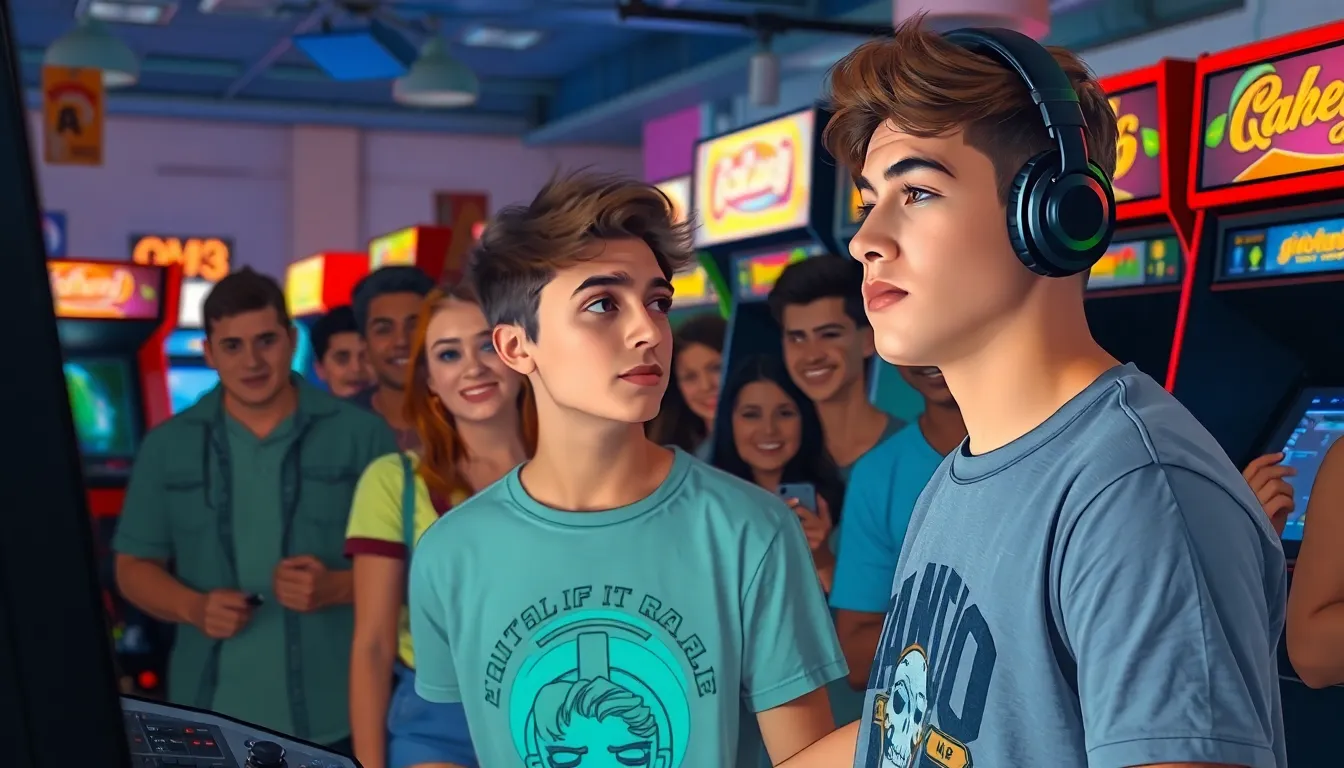
Gaming Culture: Exploring Community, Competition, and the Future of Play
Gaming culture isn’t just a hobby; it’s a vibrant community where creativity and competition collide. From epic quests to nail-biting tournaments, it’s a world where players transform into heroes, strategists, and sometimes, even couch potatoes. Whether you’re a casual gamer or a hardcore enthusiast, there’s no denying that gaming has woven itself into the fabric of modern society.
As the pixels flicker and the soundtracks swell, gamers unite across continents, sharing laughs, triumphs, and the occasional rage-quit moment. The memes, the streams, and the endless debates about the best game of all time—this culture is a rollercoaster of emotions that keeps everyone coming back for more. Dive in as we explore the fascinating layers of gaming culture and discover why it’s more than just a pastime; it’s a global phenomenon that shapes friendships, identities, and even careers.
Gaming Culture
Gaming culture represents a dynamic community that encompasses a range of activities, beliefs, and social interactions tied to video games. Players engage in various genres, including role-playing games, first-person shooters, and sports simulations, shaping unique experiences. Tournaments attract substantial audiences, showcasing skilled players competing for prizes, while streaming platforms elevate casual gameplay into a spectator sport.
Social connections form through clubs and online forums, where gamers share strategies and experiences. Multiplayer games foster teamwork and camaraderie, enabling friendships that often extend beyond the screen. Additionally, gaming conventions gather enthusiasts, offering opportunities for networking and collaboration.
The emotional spectrum in gaming fosters valuable experiences. Moments of victory create joy, while losses contribute to personal growth. Gamers often express their passions through fan art, writing, and streaming, further enriching the culture. Studies indicate that participation in gaming positively influences problem-solving skills and cognitive development.
Cultural representation within games has gained significance, with developers striving to create inclusive narratives. Diverse characters and storylines resonate with broader audiences, promoting empathy and understanding. These elements not only enhance player engagement but also encourage discussions about representation and inclusivity in the industry.
The influence of gaming culture extends beyond personal enjoyment. Economies have emerged around gaming, with professionals finding careers as content creators, developers, and esports athletes. Educational institutions increasingly recognize gaming as a legitimate field of study, reflecting its growing importance in society.
In sum, gaming culture thrives on community, creativity, and competitiveness. It shapes social interactions and influences various aspects of modern life, establishing a profound and lasting impact in contemporary society.
Evolution of Gaming Culture

Gaming culture has transformed significantly over the years, evolving into a diverse and dynamic landscape. Players now experience a rich community, where creativity and competition coexist.
Early Beginnings
The 1970s and 1980s marked the inception of gaming culture. Arcades became social hubs, drawing gamers to iconic titles like “Pong” and “Space Invaders.” Home consoles, such as the Atari 2600, expanded access to gaming, allowing players to enjoy their favorite titles at home. This period laid the foundation for friendships and rivalries, as local multiplayer experiences began to take shape. Gamers shared tips and strategies, creating a sense of community that fueled their passion for gaming.
The Rise of Online Gaming
The 1990s introduced internet connectivity, which revolutionized gaming. Online multiplayer games like “Quake” and “Ultima Online” allowed players to connect globally. Gamers formed virtual guilds and clans, enhancing social interaction and teamwork. This era prompted the birth of esports, with competitive events showcasing top talent and offering cash prizes. The convenience of online platforms led to the creation of streaming services, enabling gamers to share their experiences. Interactive platforms like Twitch fostered a culture of collaboration and community, connecting players in unprecedented ways.
Key Components of Gaming Culture
Gaming culture thrives on community engagement and social interaction. Players connect through various platforms and share experiences that enhance the sense of belonging within the gaming world.
Community and Social Interaction
Online forums serve as a backbone for vibrant discussions and shared tips. Local gaming clubs create face-to-face connections among players with similar interests. Gamers form friendships that transcend geographic boundaries. Many enjoy team-based games, emphasizing collaboration and mutual support. Social media platforms allow for real-time sharing of gameplay clips and milestones. These interactions contribute significantly to individual identities and foster inclusiveness in gaming experiences.
Esports and Competitive Gaming
Esports represents a significant aspect of modern gaming culture, attracting millions of viewers. Competitive gaming events showcase professional players who train rigorously for tournaments. Popular games nurture dedicated communities that rally around their favorite teams and players. Stakeholders including sponsors invest heavily in esports, propelling its growth exponentially. Streaming platforms like Twitch allow fans to engage with their favorite players’ live content. Earnings from competitions can lead to lucrative careers, inspiring many to pursue gaming professionally.
Influence of Gaming Culture on Society
Gaming culture significantly shapes societal dynamics. It fosters communities, influences social norms, and drives innovation in various fields.
Representation and Diversity
Representation in gaming matters immensely. Diverse narratives allow a wider array of players to see themselves in the stories they engage with. Developers increasingly create characters that reflect different backgrounds, genders, and experiences. Such representation enhances emotional connections among players. Inclusivity also opens dialogue about important social issues, encouraging both critical thinking and empathy. In response, many gaming companies now prioritize diversity in their teams, which leads to richer and more authentic game experiences. Visibility helps shape a culture that values every voice, offering gamers an opportunity to connect on deeper levels.
Gaming and Mental Health
Gaming’s impact on mental health can be profound. Many find solace in the immersive worlds that video games provide. Engaging in gameplay can act as a therapeutic distraction from daily stressors. Connections made through gaming often foster supportive relationships, reducing feelings of loneliness. Numerous studies indicate that gaming can enhance cognitive skills, such as problem-solving and teamwork. With the rise of awareness around mental health, some developers incorporate wellness themes into their narratives, promoting healthier mindsets. By offering spaces for emotional expression and connection, gaming can play a vital role in mental well-being and support personal growth.
The Future of Gaming Culture
Emerging technologies shape the future of gaming culture. Virtual reality (VR) and augmented reality (AR) redefine interactive experiences, immersing players in richer environments. Cloud gaming platforms enable access to high-quality games across devices, breaking down traditional barriers. Expanding mobile gaming also contributes to a broader audience, making gaming accessible anytime, anywhere.
Gamers’ preferences drive changes in game narratives and themes. Inclusive storytelling becomes a priority, reflecting diverse experiences and cultures. This shift allows players to engage more deeply with the characters and worlds they explore. Developers increasingly focus on mental health issues, crafting games that promote wellness and community support.
The growth of esports continues to influence gaming culture significantly. Major tournaments attract millions of fans, showcasing players’ skills on global stages. Sponsorships and media rights generate substantial revenue, solidifying esports as a professional career option. Streamers and content creators play vital roles in promoting games, often shaping trends and community discussions.
Social interactions also evolve with online platforms. Gamers find new ways to connect, sharing experiences through streaming and social media. These connections foster long-lasting friendships and unlock collaborative opportunities in gameplay and creation. Enhanced forums and platforms allow discussions around strategies, challenges, and achievements, enriching the gaming experience.
Educational institutions recognize the significance of gaming culture. Degrees focusing on game design, development, and esports administration give rise to new career paths. As gaming integrates into academic environments, it gains respect as a legitimate discipline. This acknowledgment encourages further exploration of gaming’s societal impacts, fostering innovative research and discussions.
Overall, gaming culture continually adapts to technological advancements and shifting societal values. This dynamic environment motivates developers, players, and communities to engage with gaming in meaningful ways, enhancing collective experiences.
Conclusion
Gaming culture stands as a powerful force shaping social interactions and community bonds. Its evolution over the decades has fostered connections that transcend geographical boundaries. As technology advances and gaming continues to integrate into various aspects of life, the potential for growth in this vibrant culture remains limitless.
The emphasis on diversity and representation ensures that gaming resonates with a broader audience, inviting more players to share in its rich narratives. With the rise of esports and educational opportunities, gaming culture is not just a pastime but a legitimate field that influences careers and personal development.
As players navigate this dynamic landscape, they’ll find a community that celebrates creativity, competition, and emotional connection, making gaming an integral part of modern society.
